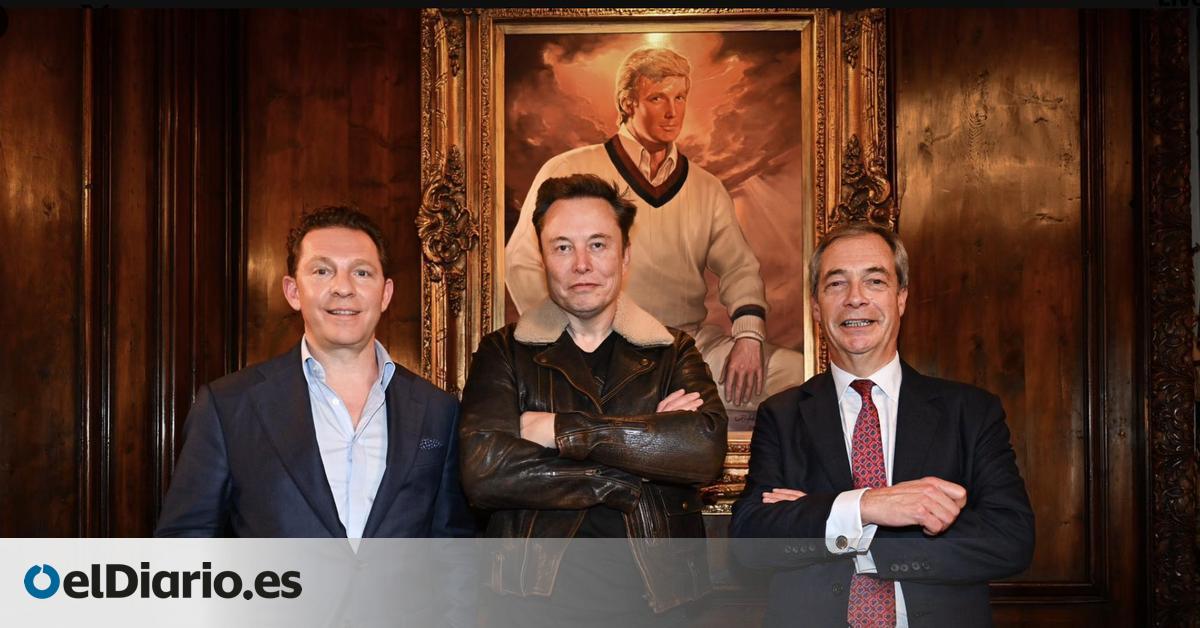
The pose of the week in the bar of Donald Trump’s club at Mar-a-Lago, in Florida, was especially careful. In the center, Elon Musk, the richest man in the world, owner of Tesla and X, and advisor to the president-elect; on one side, Nigel Farage, the leader of the far-right Reform UK party, and on the other, the party’s treasurer. In the background, The Visionary (“the visionary”), the portrait of Trump painted in 1989 by an artist who specialized in idealized images of singers and princes.
The photograph, released by Farage, was intended to signify potentially economic support for the party that now has five deputies of the 650 members of the House of Commons, but which has benefited from the collapse of the Conservative Party and won in the July 4 elections 14% of the votes. Farage, the man who achieved his main political mission, that is, taking the United Kingdom out of the EU, was an MEP, but had never won a seat in the national Parliament. He is now the least unpopular party leader in national polls.
Farage assured after the meeting that Musk is thinking about how to finance his party: “We talked about money,” Farage said on GB News, the network for which he has been a presenter and talk show host. “That is a negotiation that we will have again. He is not against giving us money. “He hasn’t quite decided whether he will do it.” “He supports us,” Farage also wrote in the conservative newspaper The Telegraph about his meeting with Musk. “He is sufficiently motivated by what is happening in the United Kingdom to seriously consider giving money.”
Farage, furthermore, says he came back from the Mar-a-Lago meeting with “a ton of notes on how to increase turnout, voter registration and much more.”
In the United States, Musk’s strategy to mobilize the vote in favor of Trump consisted of raffling off several checks for one million dollars among those who signed a petition and thus identifying potential habitually abstentionist voters.
“He’s quite intelligent, honestly,” David Axelrod, Barack Obama’s former campaign manager and veteran of American politics, explained to elDiario.es just before the elections. “The courts will have to decide if it is legal or not. Musk has approached a problem like an engineer: we need more voters in Pennsylvania, how will we solve this? And how do we identify ourselves?”
Musk spent more than 250 million dollars (about 240 million euros) to support Trump in the November 5 elections. Farage has not specified how much money he could donate to him, but another member of the party, Tim Montgomerie, said that Musk will “probably” give him an amount “around” 20 million dollars, that is, about 19 million euros. “He is fascinated by technology and by the United Kingdom,” Montgomerie said in an interview on the BBC on Thursday. “It’s as if we were a laboratory for what interests you.”
The diary The Times of London assured a few days before that the donation could be up to 100 million pounds, about 96 million euros and a figure never seen in United Kingdom politics. Farage denied that sum and Montgomerie assured that 100 would be for a country as large as the United States.
Farage has been trying for years, according to him, to “professionalize” the party, which until now has operated as a company owned by the politician and had difficulty finding enough candidates to present in the general elections. He says that “a fraction” of the money Musk could donate would already make a big difference to his party.
Support for Meloni, Salvini and the AfD
Musk has already moved to give public support to other far-right leaders in Europe. Despite being busy with the boycott of the budget agreement in the United States Congress, with more than 150 messages a day, Musk has dedicated time in the last few hours on his account to Germany, Italy and Romania.
This Friday, Trump’s billionaire advisor wrote on his network that only Alternative for Germany (AfD) “can save Germany” already thinking about the February 23 elections after months of supporting this party. His message also amplified an activist who denies the climate crisis and criticized the center-right candidate, Friedrich Merz, in a video. Musk also shared the video of the AfD candidate for chancellor, Alice Weidel.
A Musk retweet is worth money given the reach of his X account, which has more than 200 million followers and appears to users who don’t follow him. According to an analysis of Washington Postthe messages on his network have had 133 billion views since July, that is, 15 times more than Trump’s.

In recent hours, Musk has also supported Minister Matteo Salvini in the trial for blocking the landing of the Open Arms with migrants rescued at sea.
Several conservative politicians regularly try to get his attention and copy him in their messages as they did before with Trump. In some cases, it is about seeking political support, and in others about investments, as is the case of the Italian Prime Minister, Giorgia Meloni, who has met with Musk several times since 2022. This week, Meloni assured in Parliament that the billionaire is his “friend”, but that he does not take “orders from anyone” and that he will apply the new EU legislation on social media to X.
This Friday, Musk’s account also tweeted about the presidential elections in Romania, annulled by the Constitutional Court after an investigation into Russia’s inference, and accused “the judge” of being “a dictator.” Judges, in fact, are a regular target of Musk and he has also attacked judicial decisions in Italy and the United Kingdom.
Musk’s obsession with the United Kingdom is especially intense and he has already had several meetings with Farage, who has also forged a relationship with Trump and his entourage since the 2016 presidential campaign.

In the UK, there are no limits on the amount a person or company can donate to a party as long as they are resident or based in the country and declare the donation. Musk does not have British citizenship or live in the United Kingdom, but he could donate through X’s small subsidiary in the country. The company on the island has a modest turnover and profits lower than any of the donation figures that have been considered, but there is nothing now to prevent it from transferring money from its American company.
In fact, limiting what a company can donate to its funds in the United Kingdom is one of the reforms that advocates of party financing reform have long called for. Strengthening “guarantees” on donations is an electoral promise of Labor’s Keir Starmer, but it is not among the most urgent legislative priorities for his Government, which faces multiple fronts due to the deterioration of public services and the lack of economic growth.
The party financing control body advocates accelerating the change to avoid foreign interference not only from people like Musk but from businessmen linked to China, Russia or Azerbaijan.
Downing Street insisted this week that there are already rules and, above all, on trying to appease Musk, as Starmer has done without success despite the continuous insults from the owner of X, who compared him to Stalin a few weeks ago. The prime minister, according to a spokesperson, just wants to “work with President Trump and his entire administration.” On Wednesday, Starmer spoke by phone with Trump and congratulated him on his “appointments.”
In addition, the United Kingdom has appointed Peter Mandelson, former spokesman for Tony Blair and former European Commissioner, as ambassador in Washington, who a few days ago advised the Starmer Government to ask Farage for help to improve its relations with Musk.
The Tories also want
The Conservative Party, meanwhile, is trying to take advantage of the moment and court Musk in search of funds to get him out of his crisis after the July election setback.
The current leader of the Conservative Party, Kemi Badenoch, has praised Musk several times, also after he spread hoaxes that incited violence against migrants this summer in England. This week she insisted that she is “a great admirer of Elon Musk and what he has done with X” and that she supports the supposed department that he is preparing in the United States to cut public agencies and officials.
The Conservatives’ business spokesman in Parliament, Andrew Griffith, asked Musk to “take a look at the full menu” before giving money to Farage. In an interview with Financial TimesGriffith boasted that his party defends low taxes (although he raised them in recent governments due to the crisis aggravated by the effects of Brexit) and is “anti-woke” (an amorphous word that in this case refers to trans rights). According to him, his party is “the best way” for Musk to “oppose this very socialist government,” in reference to Starmer’s. Like others, he also praised the owner of X and also addressed Farage’s current tax collector in his plea.
Nick Candy, the treasurer of Reform who posed with Musk and Farage, is a real estate magnate and former donor to the Conservative Party who has defected like others due to the collapse of the party’s popularity after the scandal of Boris Johnson’s parties in the pandemic and the crisis provoked by Liz Truss with her plans to lower taxes. The announcement of Candy’s appointment as Reform treasurer came a few days before the visit to Mar-a-Lago.
Legal loophole
A donation from Musk may be the most visible case of a loophole in UK rules, which has been ignored and exploited by conservative governments in power for 14 years.
“It is crucial that UK voters have confidence in the funding of our political system,” he told the newspaper. The Guardian the executive director of the election commission, Vijay Rangarajan. “The system needs to be strengthened and we have been calling for changes to the law since 2013 to protect the electoral system from foreign interference.”
Until now the concern was more about the manipulation of authoritarian governments through billionaires based in London, but the rise of Farage and his relationship with the new and unpredictable United States Government has changed the focus.
Far-right ideas have until now been embedded in one wing of the Conservative Party and, until this year, Farage, who had withdrawn from his party, was more focused on his television career. Now it has benefited from the collapse of the Conservatives and its continued presence on networks and media, including the public BBC.
Various polls now show him to be a less unpopular politician than Starmer or any Conservative leader. But some expert voices warn against the significance of these numbers on voter preferences among national leaders.
“The responses of ‘none’ or ‘I don’t know’ are very high,” said Paula Surridge, professor of Sociology at the University of Bristol, a few days ago in a talk organized by the academic network UK in a Changing Europe. “People aren’t paying attention. The elections were six months ago. “People are just waiting to see what happens.”
Source: www.eldiario.es

